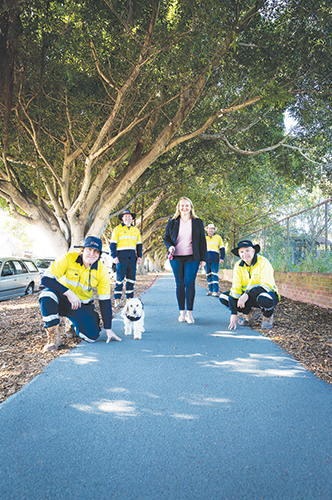Street trees are an essential part of the urban landscape across the City of Newcastle, New South Wales.
But while their ability to combat the urban heat island effect and improve the amenity of the city and suburbs is invaluable, they can pose a few issues when their roots cause damage to concrete footpaths.
Keen to find a solution to the issue, Council’s Environment and Road Maintenance teams collaborated on a project to trial the use of rubber footpaths in problem areas.
Around 170m of recycled rubber path was installed along Albert Street in Wickham last year, next to a long line of beautiful fig trees.
Made by an Australian company, the product uses rubber sourced from recycled car tyres that have been ground up into various particle sizes and coloured.
The flexible rubber path tolerates underground movement without fracturing, encourages deeper root growth, reduces trip hazards and allows trees and footpaths to live in harmony.
Replacing concrete with a permeable rubber surface also helps reduce the urban heat island effect through evaporative cooling, while decreasing the speed and amount of stormwater runoff by allowing water to filter down to natural aquifers, which in turn benefits tree health.
Implementing a solution that allows the trees to be maintained is also beneficial for the longevity of the footpaths themselves, as shade from the tree canopy reduces exposure to UV light, which can in turn decrease the speed in which the binding agents (glue) in the pavement is broken down.
Following the success of the trial, Council will examine the potential of using this product in other locations across the city should the need arise.

















